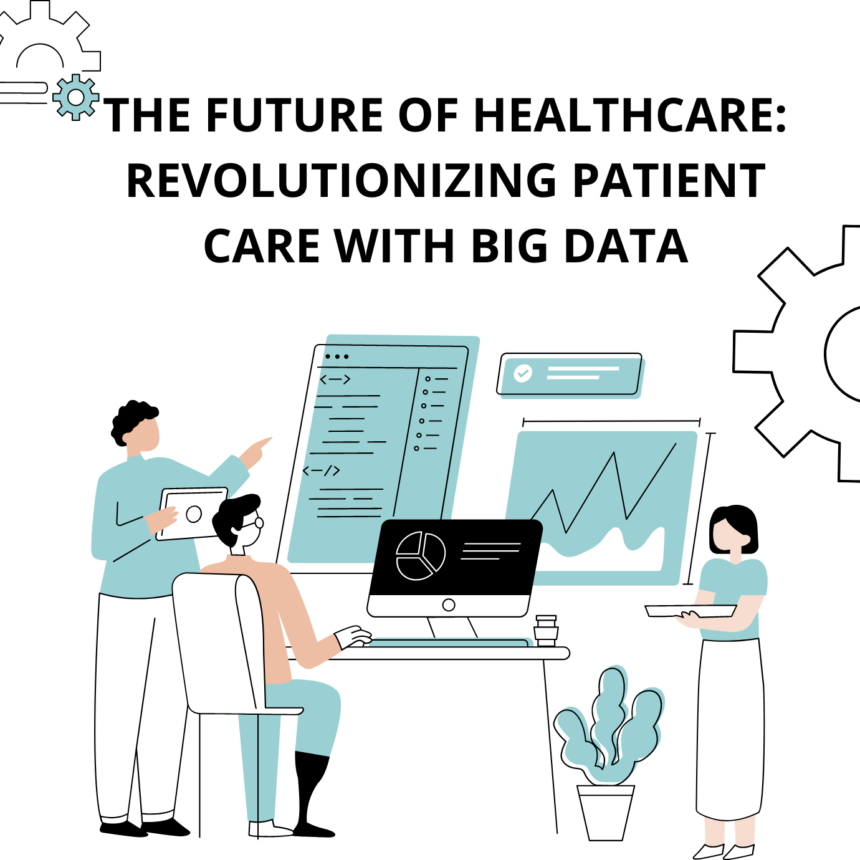Big data has the potential to revolutionize the healthcare industry, transforming the way patient care is delivered and improving health outcomes. By leveraging vast amounts of patient data, healthcare providers can gain valuable insights, enhance diagnosis and treatment, and make more informed decisions. Let’s explore how big data is shaping the future of healthcare and revolutionizing patient care:
1. Precision Medicine: Big data analytics enables precision medicine, tailoring medical treatments and interventions to individual patients based on their unique characteristics, genetics, and medical history. By analyzing large datasets that include genomic information, electronic health records, and medical research, healthcare providers can develop personalized treatment plans, identify effective therapies, and predict disease risk more accurately.
2. Early Disease Detection and Diagnosis: Big data analytics allows for the early detection and diagnosis of diseases. By analyzing patient data, including symptoms, medical history, and test results, healthcare providers can identify patterns and indicators that suggest the presence of diseases at an earlier stage. This enables proactive interventions, timely treatment, and better disease management.
3. Predictive Analytics and Risk Assessment: Big data enables predictive analytics and risk assessment models, helping healthcare providers identify patients who are at higher risk of developing certain conditions or experiencing complications. By analyzing patient data and combining it with population-level data, healthcare organizations can predict outcomes, assess disease progression, and allocate resources more efficiently to prevent adverse events.
4. Real-Time Monitoring and Alerts: Big data analytics facilitates real-time monitoring of patient health parameters and provides automated alerts. By leveraging wearable devices, sensors, and remote monitoring technologies, healthcare providers can continuously collect patient data and monitor vital signs. Real-time data analysis enables early identification of critical changes in a patient’s condition, allowing for timely interventions and improved patient outcomes.
5. Population Health Management: Big data enables population health management, allowing healthcare providers to understand health trends and patterns within specific populations. By analyzing large-scale health data, including demographics, environmental factors, and social determinants of health, healthcare organizations can identify health risks, design targeted interventions, and allocate resources effectively to improve the overall health of communities.
6. Health Research and Clinical Trials: Big data plays a significant role in advancing medical research and accelerating clinical trials. By analyzing large datasets from diverse sources, including electronic health records, genetic data, and biomedical literature, researchers can identify patterns, uncover new insights, and identify potential therapies. Big data analytics helps researchers identify suitable candidates for clinical trials, optimize trial designs, and make breakthroughs in medical research.
7. Telemedicine and Remote Care: Big data analytics supports the growth of telemedicine and remote care solutions. By analyzing patient data collected remotely, healthcare providers can deliver virtual consultations, monitor patients remotely, and provide personalized care at a distance. Big data facilitates the integration of patient data from multiple sources, enabling healthcare professionals to make informed decisions during telehealth interactions.
8. Operational Efficiency and Resource Optimization: Big data analytics improves operational efficiency within healthcare organizations. By analyzing operational data, such as patient flow, resource utilization, and supply chain management, healthcare providers can identify bottlenecks, optimize workflows, and allocate resources more effectively. This leads to reduced wait times, better resource utilization, and improved overall efficiency.
9. Patient Engagement and Self-Care: Big data empowers patients to take an active role in their healthcare through increased engagement and self-care. By leveraging patient-generated data, including wearable device data, patient-reported outcomes, and health app data, individuals can monitor their own health, make informed decisions, and actively participate in their treatment plans. Big data analytics provides personalized health recommendations and supports patients in managing their well-being.
10. Data-Driven Decision Making: Big data enables data-driven decision making at all levels of the healthcare system.
By integrating data from various sources, including clinical data, patient outcomes, and population health data, healthcare organizations can make informed decisions regarding resource allocation, treatment protocols, and public health initiatives. Data-driven decision making improves the quality and efficiency of care, leading to better patient outcomes and enhanced healthcare delivery.
The future of healthcare is intertwined with big data analytics, offering immense potential to revolutionize patient care. By harnessing the power of data, healthcare providers can deliver personalized medicine, detect diseases early, predict health risks, and optimize healthcare operations. As technology advances and data availability continues to grow, the transformative impact of big data in healthcare will continue to shape the future of patient care for the better.
